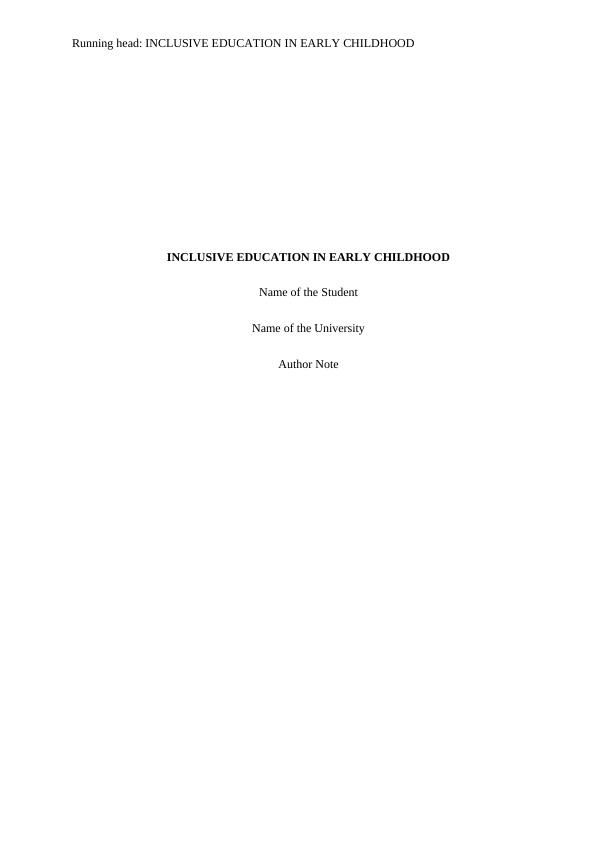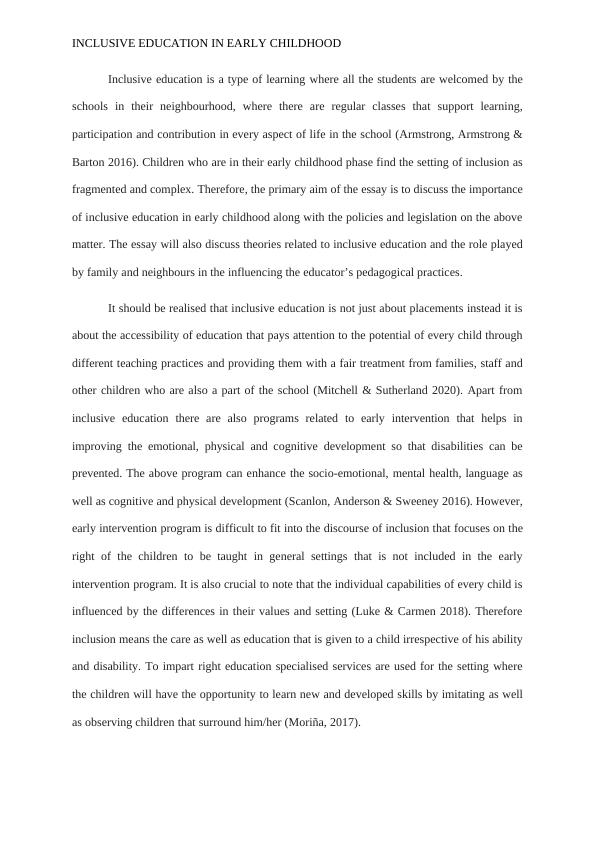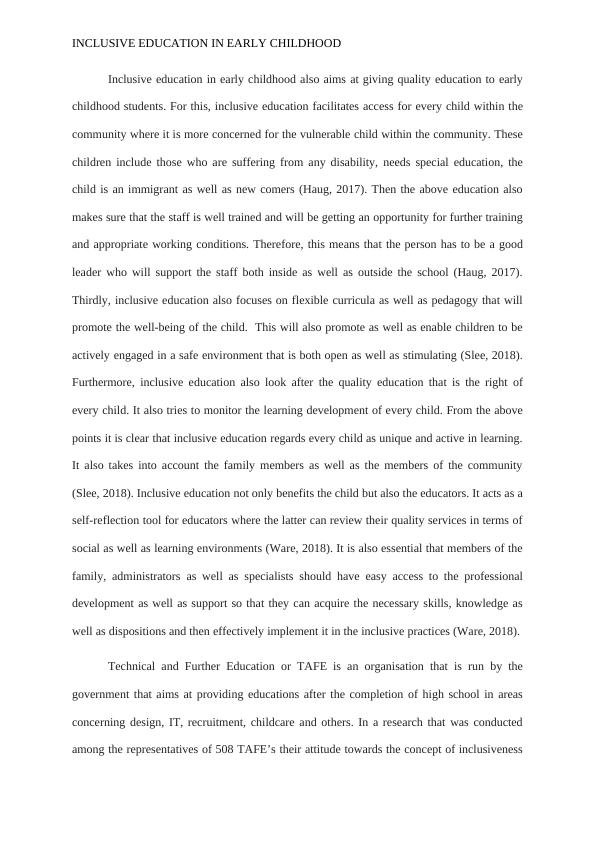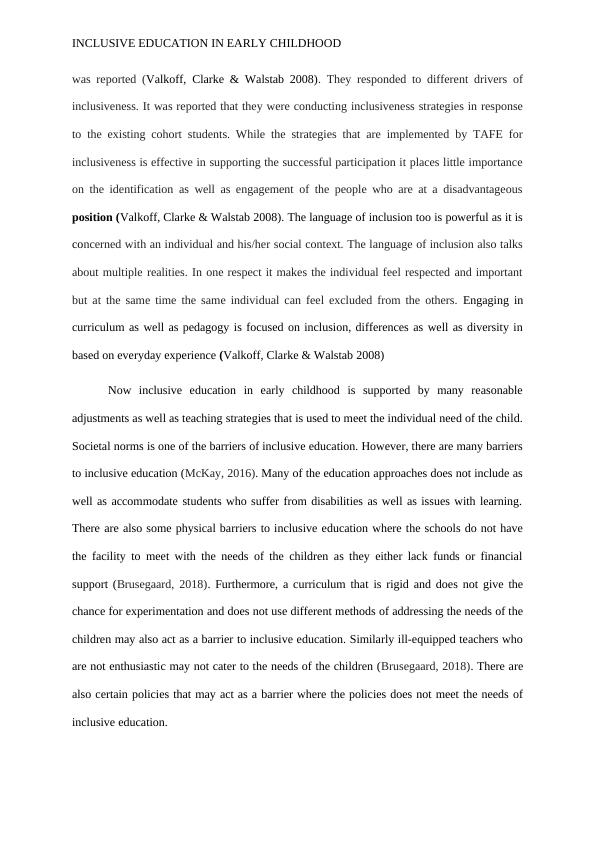Inclusive Education in Early Childhood - Essay
Added on 2022-08-27
12 Pages3729 Words49 Views
Running head: INCLUSIVE EDUCATION IN EARLY CHILDHOOD
INCLUSIVE EDUCATION IN EARLY CHILDHOOD
Name of the Student
Name of the University
Author Note
INCLUSIVE EDUCATION IN EARLY CHILDHOOD
Name of the Student
Name of the University
Author Note

INCLUSIVE EDUCATION IN EARLY CHILDHOOD
Inclusive education is a type of learning where all the students are welcomed by the
schools in their neighbourhood, where there are regular classes that support learning,
participation and contribution in every aspect of life in the school (Armstrong, Armstrong &
Barton 2016). Children who are in their early childhood phase find the setting of inclusion as
fragmented and complex. Therefore, the primary aim of the essay is to discuss the importance
of inclusive education in early childhood along with the policies and legislation on the above
matter. The essay will also discuss theories related to inclusive education and the role played
by family and neighbours in the influencing the educator’s pedagogical practices.
It should be realised that inclusive education is not just about placements instead it is
about the accessibility of education that pays attention to the potential of every child through
different teaching practices and providing them with a fair treatment from families, staff and
other children who are also a part of the school (Mitchell & Sutherland 2020). Apart from
inclusive education there are also programs related to early intervention that helps in
improving the emotional, physical and cognitive development so that disabilities can be
prevented. The above program can enhance the socio-emotional, mental health, language as
well as cognitive and physical development (Scanlon, Anderson & Sweeney 2016). However,
early intervention program is difficult to fit into the discourse of inclusion that focuses on the
right of the children to be taught in general settings that is not included in the early
intervention program. It is also crucial to note that the individual capabilities of every child is
influenced by the differences in their values and setting (Luke & Carmen 2018). Therefore
inclusion means the care as well as education that is given to a child irrespective of his ability
and disability. To impart right education specialised services are used for the setting where
the children will have the opportunity to learn new and developed skills by imitating as well
as observing children that surround him/her (Moriña, 2017).
Inclusive education is a type of learning where all the students are welcomed by the
schools in their neighbourhood, where there are regular classes that support learning,
participation and contribution in every aspect of life in the school (Armstrong, Armstrong &
Barton 2016). Children who are in their early childhood phase find the setting of inclusion as
fragmented and complex. Therefore, the primary aim of the essay is to discuss the importance
of inclusive education in early childhood along with the policies and legislation on the above
matter. The essay will also discuss theories related to inclusive education and the role played
by family and neighbours in the influencing the educator’s pedagogical practices.
It should be realised that inclusive education is not just about placements instead it is
about the accessibility of education that pays attention to the potential of every child through
different teaching practices and providing them with a fair treatment from families, staff and
other children who are also a part of the school (Mitchell & Sutherland 2020). Apart from
inclusive education there are also programs related to early intervention that helps in
improving the emotional, physical and cognitive development so that disabilities can be
prevented. The above program can enhance the socio-emotional, mental health, language as
well as cognitive and physical development (Scanlon, Anderson & Sweeney 2016). However,
early intervention program is difficult to fit into the discourse of inclusion that focuses on the
right of the children to be taught in general settings that is not included in the early
intervention program. It is also crucial to note that the individual capabilities of every child is
influenced by the differences in their values and setting (Luke & Carmen 2018). Therefore
inclusion means the care as well as education that is given to a child irrespective of his ability
and disability. To impart right education specialised services are used for the setting where
the children will have the opportunity to learn new and developed skills by imitating as well
as observing children that surround him/her (Moriña, 2017).

INCLUSIVE EDUCATION IN EARLY CHILDHOOD
Inclusive education in early childhood also aims at giving quality education to early
childhood students. For this, inclusive education facilitates access for every child within the
community where it is more concerned for the vulnerable child within the community. These
children include those who are suffering from any disability, needs special education, the
child is an immigrant as well as new comers (Haug, 2017). Then the above education also
makes sure that the staff is well trained and will be getting an opportunity for further training
and appropriate working conditions. Therefore, this means that the person has to be a good
leader who will support the staff both inside as well as outside the school (Haug, 2017).
Thirdly, inclusive education also focuses on flexible curricula as well as pedagogy that will
promote the well-being of the child. This will also promote as well as enable children to be
actively engaged in a safe environment that is both open as well as stimulating (Slee, 2018).
Furthermore, inclusive education also look after the quality education that is the right of
every child. It also tries to monitor the learning development of every child. From the above
points it is clear that inclusive education regards every child as unique and active in learning.
It also takes into account the family members as well as the members of the community
(Slee, 2018). Inclusive education not only benefits the child but also the educators. It acts as a
self-reflection tool for educators where the latter can review their quality services in terms of
social as well as learning environments (Ware, 2018). It is also essential that members of the
family, administrators as well as specialists should have easy access to the professional
development as well as support so that they can acquire the necessary skills, knowledge as
well as dispositions and then effectively implement it in the inclusive practices (Ware, 2018).
Technical and Further Education or TAFE is an organisation that is run by the
government that aims at providing educations after the completion of high school in areas
concerning design, IT, recruitment, childcare and others. In a research that was conducted
among the representatives of 508 TAFE’s their attitude towards the concept of inclusiveness
Inclusive education in early childhood also aims at giving quality education to early
childhood students. For this, inclusive education facilitates access for every child within the
community where it is more concerned for the vulnerable child within the community. These
children include those who are suffering from any disability, needs special education, the
child is an immigrant as well as new comers (Haug, 2017). Then the above education also
makes sure that the staff is well trained and will be getting an opportunity for further training
and appropriate working conditions. Therefore, this means that the person has to be a good
leader who will support the staff both inside as well as outside the school (Haug, 2017).
Thirdly, inclusive education also focuses on flexible curricula as well as pedagogy that will
promote the well-being of the child. This will also promote as well as enable children to be
actively engaged in a safe environment that is both open as well as stimulating (Slee, 2018).
Furthermore, inclusive education also look after the quality education that is the right of
every child. It also tries to monitor the learning development of every child. From the above
points it is clear that inclusive education regards every child as unique and active in learning.
It also takes into account the family members as well as the members of the community
(Slee, 2018). Inclusive education not only benefits the child but also the educators. It acts as a
self-reflection tool for educators where the latter can review their quality services in terms of
social as well as learning environments (Ware, 2018). It is also essential that members of the
family, administrators as well as specialists should have easy access to the professional
development as well as support so that they can acquire the necessary skills, knowledge as
well as dispositions and then effectively implement it in the inclusive practices (Ware, 2018).
Technical and Further Education or TAFE is an organisation that is run by the
government that aims at providing educations after the completion of high school in areas
concerning design, IT, recruitment, childcare and others. In a research that was conducted
among the representatives of 508 TAFE’s their attitude towards the concept of inclusiveness

INCLUSIVE EDUCATION IN EARLY CHILDHOOD
was reported (Valkoff, Clarke & Walstab 2008). They responded to different drivers of
inclusiveness. It was reported that they were conducting inclusiveness strategies in response
to the existing cohort students. While the strategies that are implemented by TAFE for
inclusiveness is effective in supporting the successful participation it places little importance
on the identification as well as engagement of the people who are at a disadvantageous
position (Valkoff, Clarke & Walstab 2008). The language of inclusion too is powerful as it is
concerned with an individual and his/her social context. The language of inclusion also talks
about multiple realities. In one respect it makes the individual feel respected and important
but at the same time the same individual can feel excluded from the others. Engaging in
curriculum as well as pedagogy is focused on inclusion, differences as well as diversity in
based on everyday experience (Valkoff, Clarke & Walstab 2008)
Now inclusive education in early childhood is supported by many reasonable
adjustments as well as teaching strategies that is used to meet the individual need of the child.
Societal norms is one of the barriers of inclusive education. However, there are many barriers
to inclusive education (McKay, 2016). Many of the education approaches does not include as
well as accommodate students who suffer from disabilities as well as issues with learning.
There are also some physical barriers to inclusive education where the schools do not have
the facility to meet with the needs of the children as they either lack funds or financial
support (Brusegaard, 2018). Furthermore, a curriculum that is rigid and does not give the
chance for experimentation and does not use different methods of addressing the needs of the
children may also act as a barrier to inclusive education. Similarly ill-equipped teachers who
are not enthusiastic may not cater to the needs of the children (Brusegaard, 2018). There are
also certain policies that may act as a barrier where the policies does not meet the needs of
inclusive education.
was reported (Valkoff, Clarke & Walstab 2008). They responded to different drivers of
inclusiveness. It was reported that they were conducting inclusiveness strategies in response
to the existing cohort students. While the strategies that are implemented by TAFE for
inclusiveness is effective in supporting the successful participation it places little importance
on the identification as well as engagement of the people who are at a disadvantageous
position (Valkoff, Clarke & Walstab 2008). The language of inclusion too is powerful as it is
concerned with an individual and his/her social context. The language of inclusion also talks
about multiple realities. In one respect it makes the individual feel respected and important
but at the same time the same individual can feel excluded from the others. Engaging in
curriculum as well as pedagogy is focused on inclusion, differences as well as diversity in
based on everyday experience (Valkoff, Clarke & Walstab 2008)
Now inclusive education in early childhood is supported by many reasonable
adjustments as well as teaching strategies that is used to meet the individual need of the child.
Societal norms is one of the barriers of inclusive education. However, there are many barriers
to inclusive education (McKay, 2016). Many of the education approaches does not include as
well as accommodate students who suffer from disabilities as well as issues with learning.
There are also some physical barriers to inclusive education where the schools do not have
the facility to meet with the needs of the children as they either lack funds or financial
support (Brusegaard, 2018). Furthermore, a curriculum that is rigid and does not give the
chance for experimentation and does not use different methods of addressing the needs of the
children may also act as a barrier to inclusive education. Similarly ill-equipped teachers who
are not enthusiastic may not cater to the needs of the children (Brusegaard, 2018). There are
also certain policies that may act as a barrier where the policies does not meet the needs of
inclusive education.

End of preview
Want to access all the pages? Upload your documents or become a member.
Related Documents
Inclusive Learning in Early Childhood Education: Perspectives, Legislation, and Developmental Theorieslg...
|12
|4220
|247
Early Childhood Studies Article 2022lg...
|13
|4037
|10
Childhood Educational Policieslg...
|11
|2973
|130
Reflection on 'Right to Play' for Childrenlg...
|8
|2076
|48
INCLUSIVE PROGRAM.lg...
|7
|1903
|470
Inclusive Education in Early Childhood Settinglg...
|9
|2934
|72
